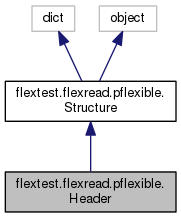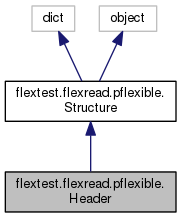|
FLEXPART Testing Environment CTBTO WO8
|


Public Member Functions | |
| def | __init__ |
| def | lonlat |
| def | read_grid |
| def | fill_backward |
| def | add_trajectory |
| def | add_fires |
| def | closest_dates |
| def | closest_date |
 Public Member Functions inherited from flextest.flexread.pflexible.Structure Public Member Functions inherited from flextest.flexread.pflexible.Structure | |
| def | __getattr__ |
| def | __setattr__ |
| def | __dir__ |
| def | set_with_dict |
| def | __dir__ |
Public Attributes | |
| version | |
| longitude | |
| latitude | |
| FD | |
| trajectory | |
| fires | |
This is the primary starting point for processing FLEXPART output.
The Header class ( :class:`Structure` ) behaves like a dictionary.
It contains all the metadata from the simulation run as read from the
"header" or "header_nest" binary files from the model output.
This version is using the BinaryFile class rather than FortFlex.
Usage::
> H = pf.Header(inputpath)
> H.keys() #provides a list of keys available
Returns a dictionary
H = dictionary like object with all the run metadata. TODO: Fill in keys.
Arguments
.. tabularcolumns:: |l|L|
============== ========================================
keyword Description [default]
============== ========================================
path path to the run directory
headerfile name of the header file if non standard
readheader_ops optional dictionary to pass readheader
============== ========================================
Arguments for readheader_ops
.. tabularcolumns:: |l|L|
============= ========================================
keyword Description [default]
============= ========================================
pathname FLEXPART run output directory
readp read release points 0=no, [1]=y
nested nested output True or [False]
version version of FLEXPART, default = 'V8'
============= ========================================
.. note::
**This function is in development**
This function is being developed so that there is no dependence on
using f2py to compile the FortFlex module. It is working using the
:class:`BinaryFile`, but is notably slower than :class:`FortFlex`.
Please report any bugs found.
Definition at line 4693 of file pflexible.py.
| def flextest.flexread.pflexible.Header.__init__ | ( | self, | |
path = None, |
|||
headerfile = None, |
|||
version = 'V8', |
|||
| readheader_ops | |||
| ) |
Definition at line 4749 of file pflexible.py.

| def flextest.flexread.pflexible.Header.add_fires | ( | self, | |
| kwargs | |||
| ) |
uses the :mod:`emissions` module to read the MODIS hotspot data and add it to the header class as a 'fires' attribute. **This function is only available within NILU.**
Definition at line 4787 of file pflexible.py.
| def flextest.flexread.pflexible.Header.add_trajectory | ( | self, | |
| kwargs | |||
| ) |
| def flextest.flexread.pflexible.Header.closest_date | ( | self, | |
| dateval, | |||
fmt = None |
|||
| ) |
given a datestring or datetime, tries to find the closest date.
if passed a list, assumes it is a list of datetimes
Definition at line 4832 of file pflexible.py.

| def flextest.flexread.pflexible.Header.closest_dates | ( | self, | |
| dateval, | |||
fmt = None, |
|||
take_set = False |
|||
| ) |
given an iterable of datetimes, finds the closest dates.
if passed a list, assumes it is a list of datetimes
if take_set=True, then a set of unique values will be returned.
This can be used with H.read_grid as the value for time_ret to
return only the grids matching the array of times.
See (e.g. `extract_curtain`).
Definition at line 4811 of file pflexible.py.

| def flextest.flexread.pflexible.Header.fill_backward | ( | self, | |
| kwargs | |||
| ) |

| def flextest.flexread.pflexible.Header.lonlat | ( | self | ) |
Add longitude and latitude attributes using data from header
Definition at line 4768 of file pflexible.py.
| def flextest.flexread.pflexible.Header.read_grid | ( | self, | |
| kwargs | |||
| ) |
| flextest.flexread.pflexible.Header.FD |
Definition at line 4777 of file pflexible.py.
| flextest.flexread.pflexible.Header.fires |
Definition at line 4796 of file pflexible.py.
| flextest.flexread.pflexible.Header.latitude |
Definition at line 4773 of file pflexible.py.
| flextest.flexread.pflexible.Header.longitude |
Definition at line 4772 of file pflexible.py.
| flextest.flexread.pflexible.Header.trajectory |
Definition at line 4785 of file pflexible.py.
| flextest.flexread.pflexible.Header.version |
Definition at line 4758 of file pflexible.py.
 1.8.6
1.8.6